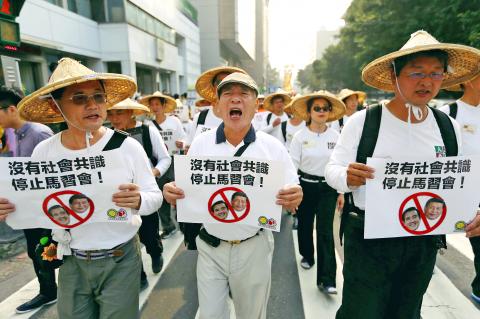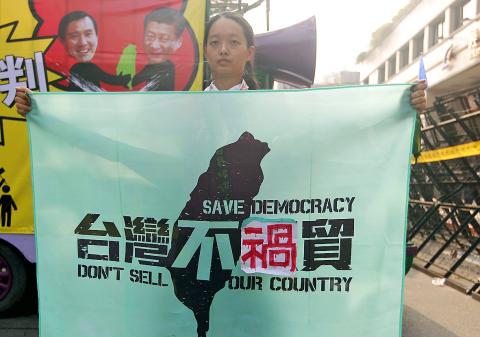A protester holds a flag during a demonstration outside the Ministry of Economic Affairs in Taipei against the Singapore meeting between President Ma Ying-jeou and Chinese President Xi Jinping.
Photo: Reuters
Yesterday’s meeting between President Ma Ying-jeou (馬英九) and Chinese President Xi Jinping (習近平) prompted a protest outside the Presidential Office Building, with activists condemning the meeting and pledging to continue the fight against negotiations over the trade in goods agreement with China.

Photo: EPA
“The Ma-Xi meeting demonstrates that ‘one China with different interpretations’ and the [so-called] ‘1992 consensus’ are shattered, made-up constructions,” Economic Democracy Union convener Lai Chung-chiang (賴中強) said.
The “1992 consensus” is a term former Mainland Affairs Council chairman Su Chi (蘇起) in 2006 admitted to making up in 2000, referring to a tacit understanding between the Chinese Nationalist Party (KMT) and the Chinese government that both sides of the Taiwan Strait acknowledge there is “one China,” with each side having its own interpretation of what “China” means.
“The Ma-Xi meeting, which adhered to the ‘one China’ principle, has definitively wounded the right of Taiwanese to reject possible futures,” Lai said, adding that civic organizations would fight a prospective trade in goods agreement and mutual establishment of representative offices, which Ma said following the meeting that he would push forward.

Photo: Reuters
Both would be opposed by civic groups as tools used by Beijing to further reunification, Lai said.
The protesters marched through downtown Taipei yesterday afternoon, blocking off lanes of traffic and shutting down roads as they weaved along a 3km route from the Ministry of Economic Affairs building and several other government offices before walking down Ketagalan Boulevard to reach the Presidential Office Building.
Before setting off, protesters shouted a series of slogans protesting the meeting and negotiations, telling Ma to “not come back” because they were willing to “give you [him] to Singapore.”
Preparations for the march were initiated several weeks ago by the Economic Democracy Union, which quickly rebranded and expanded it from a prior focus on trade in goods negotiations after the announcement last week of the Ma-Xi meeting.
Most protesters were from the more than 20 civic organizations that co-sponsored the protest, including Taiwan Association for Human Rights, Restoration of Taiwan Social Justice, Taiwan March and Democracy Tautin.
“We are concerned that the meeting will restrict future administrations [to a ‘one China’ framework], but because they will not sign a formal agreement, it is difficult for the Legislative Yuan to exercise its supervisory powers,” Restoration of Taiwan Social Justice’s research department director Lin Jia-yu (林家宇) said.
Protesters carried flags and banners of their organizations, with Taiwan Solidarity Party, New Power Party, Green Party-Social Democratic Party Alliance and Free Taiwan Party representatives bringing up the rear.
After an initial demonstration in front of the Ministry of Economic Affairs building, they wove their way through traffic to put on a short play in front of the Bureau of Foreign Trade office, with actors representing large corporations wearing masks to symbolize what they say is opaque handling of the trade in goods talks.
While negotiations would mainly benefit the paneling, automotive and petrochemical industries controlled by major companies, many small firms would be placed at a disadvantage and the Ma administration has attempted to “mask” this reality by claiming that the talks would include cosmetic facial masks — helping the small firms comprising that industry, protesters said.
The protesters moved to the Council of Agriculture building to protest a rumored opening up of agricultural markets before making their way to the front of the Presidential Office Building, where prominent figures delivered speeches condemning the meeting and the negotiations.
“We refuse to accept any results of the Ma-Xi meeting,” said Lin Fei-fan (林飛帆), a prominent leader of last year’s Sunflower movement.
The Sunflower movement saw the Legislative Yuan surrounded by thousands of protesters for weeks while Lin and other activists occupied the legislature’s main chamber to protest a service trade agreement with China.
“This reflects the consistent thinking of the Ma administration; it did not have sufficient authorization to negotiate the service trade agreement and the lack of sufficient democratic authorization is the most serious problem with the Ma-Xi meeting,” Lin said, adding that Ma had done everything he could to avoid supervision by the Legislative Yuan.
“There is still no consensus on what relationship we should maintain with China or what we imagine our future should look like,” Lin said. “However, Ma has used his identity as a president who is about to step down to frame and limit future cross-strait interactions.”
Even if the meeting did not produce a written agreement, the negotiations to arrange it should still have been subject to legislative approval, Lin said.

CHAOS: Iranians took to the streets playing celebratory music after reports of Khamenei’s death on Saturday, while mourners also gathered in Tehran yesterday Iranian Supreme Leader Ayatollah Ali Khamenei was killed in a major attack on Iran launched by Israel and the US, throwing the future of the Islamic republic into doubt and raising the risk of regional instability. Iranian state television and the state-run IRNA news agency announced the 86-year-old’s death early yesterday. US President Donald Trump said it gave Iranians their “greatest chance” to “take back” their country. The announcements came after a joint US and Israeli aerial bombardment that targeted Iranian military and governmental sites. Trump said the “heavy and pinpoint bombing” would continue through the week or as long

TRUST: The KMT said it respected the US’ timing and considerations, and hoped it would continue to honor its commitments to helping Taiwan bolster its defenses and deterrence US President Donald Trump is delaying a multibillion-dollar arms sale to Taiwan to ensure his visit to Beijing is successful, a New York Times report said. The weapons sales package has stalled in the US Department of State, the report said, citing US officials it did not identify. The White House has told agencies not to push forward ahead of Trump’s meeting with Chinese President Xi Jinping (習近平), it said. The two last month held a phone call to discuss trade and geopolitical flashpoints ahead of the summit. Xi raised the Taiwan issue and urged the US to handle arms sales to

BIG SPENDERS: Foreign investors bought the most Taiwan equities since 2005, signaling confidence that an AI boom would continue to benefit chipmakers Taiwan Semiconductor Manufacturing Co’s (TSMC, 台積電) market capitalization swelled to US$2 trillion for the first time following a 4.25 percent rally in its American depositary receipts (ADR) overnight, putting the world’s biggest contract chipmaker sixth on the list of the world’s biggest companies by market capitalization, just behind Amazon.com Inc. The site CompaniesMarketcap.com ranked TSMC ahead of Saudi Aramco and Meta Platforms Inc. The Taiwanese company’s ADRs on Tuesday surged to US$385.75 on the New York Stock Exchange, as strong demand for artificial intelligence (AI) applications led to chip supply constraints and boost revenue growth to record-breaking levels. Each TSMC ADR represents

State-run CPC Corp, Taiwan (CPC, 台灣中油) yesterday said that it had confirmed on Saturday night with its liquefied natural gas (LNG) and crude oil suppliers that shipments are proceeding as scheduled and that domestic supplies remain unaffected. The CPC yesterday announced the gasoline and diesel prices will rise by NT$0.2 and NT$0.4 per liter, respectively, starting Monday, citing Middle East tensions and blizzards in the eastern United States. CPC also iterated it has been reducing the proportion of crude oil imports from the Middle East and diversifying its supply sources in the past few years in response to geopolitical risks, expanding